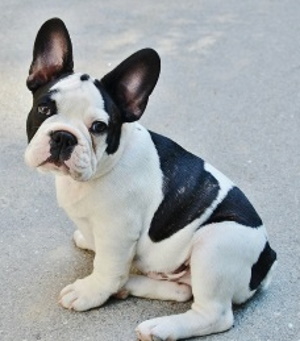French Bull Dogs -
A Smart Little Frenchie!
French Bull Dogs, though symbolic to France, are believed to have originated and been developed from the English bulldog. There is no doubt some truth to this belief as it is evident that a number of miniature English bull dogs found their way to France around 1860 and were subsequently cross bred with other breeds.

During their ongoing refinement, there were some notable differences between ear shapes - some having a rose ear while others having a bat shaped
ear. The bat ear won out and has become a distinctive feature
of the breed as has the flat skull shape - differentiating it from other
bulldogs.
As time went on the breed gained significant recognition which ultimately led to the formation of the French Bull Dog Club Of America founded in 1897.
A major surge in popularity followed an event in New York, hosted by the club to showcase the breed.
The Frenchie, originally known as Boule-Dog Francais, was once used for bull baiting, but is now a companion dog with considerable following.
Currently, as of 2025, he tops the charts as the most popular breed in New York city. He also rates very highly in many other major cities around the country.
The French Bulldog is
a handsome, active, intelligent, muscular dog
with
a broad chest, sturdy and heavy boned with facial features reminiscent of the pug. The "bat" ears are a
distinct feature of the breed today.
Characteristics of French Bull Dogs
The French Bulldog is vivacious, entertaining and is known for his clownish behavior. He thrives on people contact and really
needs to be with a family that can involve him in their activities.
Frenchies have a loving and easy going disposition. But also have a determined side of their nature - probably a carry over
from their days in the bull ring when they needed it.
If pet parents make sure they are viewed as the head honcho, any
"bullheadedness" won't be a problem. Otherwise, watch out, these smart little dogs may lapse into bad habits.
All in all, the Frenchie is a very charming brick of a dog and very trainable in the hands of someone who is calm and consistent. They
are generally not barkers, but will sound the alarm to announce approaching visitors, reliably filling the position as a watchdog.
Want to know more about living with a Frenchie? Here's what French Bulldog owners have to say:
- Get pet insurance. This is a must.
- They’re not the easiest to potty train.
- Do not let them overheat.
- Prone to skin allergies.
- Get pet insurance as soon as you can.
- Get doggy steps to protect their back.
- Adorable - steal the hearts.
- Frenchies rule the roost.
- Extremely attached to owners.
- Like getting their way.
- Can be wicked smart.
- Purchase pet insurance asap.
- Wipe folds every day.
- Sweet but stubborn.
- Avoid walks in hot sun.
- Prescription diet has been life changing.
- Their eyes weep and go into folds.
- Get insurance while young.
- Lovable, smart, stubborn.
- Give them lots of love.
- You will need pet insurance.
- Limit jumping.
- Pet insurance.
- Keep a healthy weight.
- Lump of fun.
- So many potential health issues.
Training
French Bulldogs are smart but stubborn so they may not always follow commands right away—especially if
they're not in the mood! Puppy classes can be helpful for easing into the basic cues and getting your pet socialized with other dogs and people.
Potty training can take a while and be a challenge. The crate is your friend in this regard and can remarkably speed up the process. As long as you take notes of his daily habits, you will know when to let him out for a successful bathroom break! But make sure to stay nearby to pile on the praise.
The Frenchie is food-driven so using treat rewards can help motive him while training, gradually reducing them over time to avoid weight gains.
Positive reinforcement, patience and consistency are key, followed by praise or rewards when he gets it right!
Appearance And Care
Weight: Includes two classes: under 22 pounds and 22-28 pounds
Height: 12 inches
Lifespan: Up to twelve years or more with good care
Coat colors of the Frenchies can be brindle, fawn, white, and brindle and white. Solid black, liver, mouse, black and tan.
Black and white, and white with black are not acceptable in the standard.
The Frenchie has a compact, well balanced muscular body that appears in good proportion. The tail is short and hangs low. It is either straight or screwed with a thick root and fine tip.
The head is large and square with erect bat ears that are broad at the base and round at the top and set high on the head but not too close together. Eyes are medium-sized, dark brown or close to black in color. His expression is alert, curious, and attentive.
Both front and back legs are stout and muscular with back legs being longer, elevating his hind end above the shoulders.
The feet are medium-sized and compact with rear feet being slightly longer than the front ones.
The coat of French Bull Dogs is fine and has a nice soft texture. It sheds about average. Maintenance includes:
- Combing and brushing the coat with a soft bristle brush, plus wiping it down with a damp towel.
- Regular cleaning of the ears and of the deep facial folds and around the tail to prevent infections and skin irritations, making sure to dry thoroughly.
- Regular nail trimming is a must - best started while still a puppy. Long nails can cause health issues and most dogs don’t usually wear their nails down by day to day activity. Use a dremel instead of clippers for a less traumatic experience.
- Brush teeth regularly using a dog toothbrush and enzymatic dog toothpaste. Aim for daily brushing, or at least 3 times a week. Frenchies and similar breeds are even more predisposed to dental disease, making dental care a high priority. Poor oral hygiene can lead to a slew of other serious health problems for them, something they don't need.
- Anal glands may need to be expressed from time to time - vet can demonstrate.

Health of French Bull Dogs
French bulldogs have a higher number of potential health issues, some related to their flat face structure. Here are some of the main ones:
- Brachycephalic syndrome: Commonly affects short nosed dogs dog breeds, This syndrome may result in snoring, snorting, and labored breathing, especially in hot or humid conditions. Some can be helped with surgery for this issue.
- Hip dysplasia: This is an inherited issue involving the hip joint that results in pain, muscle loss and lameness. It’s a degenerative disease, but there are many ways vets can help to relieve pain. Hip dysplasia is more common in larger dog breeds, but it can can affect any dog, including French bulldogs.
- Skin issues and allergies. Skin and tail folds create a warm and moist environment, predisposing the Frenchie to infections, rashes, hot spots, dermatitis and itchy spots.
- Ear Infections which can be mostly prevented with regular cleaning unless they become chronic and need a vet's attention.
- Heart issues: Pulmonic stenosis is a congenital heart disease in which the pulmonary valve and artery (the valve and artery that lead from the heart to the lungs) are narrowed.
- Eye problems: Cherry eye, juvenile cataracts, and entropion.
- Intervertebral disc disease: A neurological disorder caused by deterioration of the spine and resulting in herniation, degeneration and protrusion of discs that can especially affect long-backed breeds such as Dachshunds. Unfortunately, Frenchies are also at high risk for this condition which appears to be linked to their weight and short legs.
- Patellar Luxation: This occurs when the kneecap slips out of place and suddenly results in limping for a few steps while running. If severe, surgery may be needed fix the issue.
- Brain tumors: Studies have shown a higher incidence of brain tumors in French Bulldog
It is important that Frenchies be kept at the ideal weight; an overweight French Bulldog is at a much higher risk for many of the breed’s noted health issues. Obesity also puts more strain on their joints, and makes breathing more difficult.
To protect your dog's back and joints and restrain him from jumping on to couches, beds, cars etc., ramps and doggy steps can be helpful.
Ir's been noted that this breed can't swim, so should wear a life jacket around water and be carefully supervised.
Recommended Health Tests From the National Breed Club:
- Patella Evaluation
- Hip Evaluation
- Cardiac Exam
- Ophthalmologist Evaluation
When meeting with a breeder, ask to see their health testing results. A responsible breeder will be dedicated to ensuring healthy puppies.
With the benefit of a high quality diet, matched to the dog's age, moderate exercise and regular health checks with a veterinarian, pet parents can expect to enjoy their Frenchie for up to 12 years.
Activity Level of French Bull Dogs
Most French bull dogs are fairly active around the house, but still need a daily walk for good health, as well
as to instill the structure they need from you - their pack leader.
Exercise in moderation and take care not to over-stress them in warm weather
as they overheat easily when the temperature rises.
Short-nosed breeds such as the Frenchie, along with similar dogs for example Pugs and Boston Terriers, are referred to as brachycephalic dogs and are subject to respiratory health issues which makes their breathing
less efficient. As a result, their air flow can be restricted if they are
overexerted.
Keep your French Bulldog cool in warm and humid weather, and avoid strenuous exercise. They cannot tolerance vigorous exercise and are very susceptible to heat exhaustion and heat stroke.
Ideal Living Space
The French Bulldog doesn't need a lot of room and will easily adapt to house or apartment. Compared to other small breeds, they are not known to be nuisance barkers which is a plus if in close proximity to neighbors.
While they don't need a lot of outdoor activity, don't try to keep them housebound - the mental stimulation of getting out for a walk is necessary to all canines. Plus, you want to show them off - right!
The Frenchie With Children?
This breed is an excellent family dog and has a good reputation with children. They are ideal, and do best, in families with children old enough to understand kindness and respect for dogs while still being able to show leadership.
Ask the breeder if your dogs parents did well with kids.
Also, small children sometimes want to pick dogs up and these little dogs are surprisingly heavy. Frenchies also need careful handling because of being prone to back problems!
No matter what the breed, dogs don't always live up to their reputation. That said, it is always the recommended policy to have an adult supervise interactions between kids and their pets.
Seniors Or The Less Active?
French Bull Dogs are irresistible, very affectionate and make great companion dogs for seniors or less active
families. Stay-at-home pet parents are ideal for providing the love and
close attention the
Frenchie seeks.
Additionally, they don't need a lot of exercise and grooming needs and not excessive.
The biggest drawback would be dealing with the likelihood of many health issues, both from a financial standpoint as well as the ability to care for them.
Finding French Bull Dogs
To find French Bull Dogs, the first step is locating a reputable breeder. A professional breeder is concerned with the quality and health of their puppies.
Avoid casual back yard breeders and puppy mills which are not concerned with upholding any standard - only about the breed's popularity and making sales.
Here are some places to begin your search:
- The American Kennel Club maintains a list of breeders pledged to uphold AKC-endorsed responsible breeding practices: https://www.marketplace.akc.org/
- Available puppies can also be found in the AKC Marketplace: https://marketplace.akc.org/.
Local French bulldog clubs breed clubs and sometimes local animal shelters are other sources to check for rescues and adoptable dogs. Other options include attending local dog shows and connecting with breeders.
The cost to purchase a
French Bulldog is between $1,500 to $8,000. The reputation of the breeder, lineage, coat color, and health testing can have an affect on the price. Rarer coat colors can also command higher prices.
Before You Go...
If you like the content of this page, as well as others on my site, please give it some love by clicking on the heart in the lower right hand corner. This helps me to keep providing enjoyable and useful content.
Thank you.
Further Reading

This one-stop ‘instruction manual’ is the essential companion to your lovable French Bulldog. Over 192 pages we cover everything you should know from buying a new puppy through to old age and how best to look after your precious French Bulldog.
The book written in an easy-to-understand style with funny and
entertaining stories interspersed with practical, actionable advice and
tips from all our qualified expert breeders, including a Westminster dog
show best of breed winner, who writes a special bonus chapter about
showing Frenchies.







